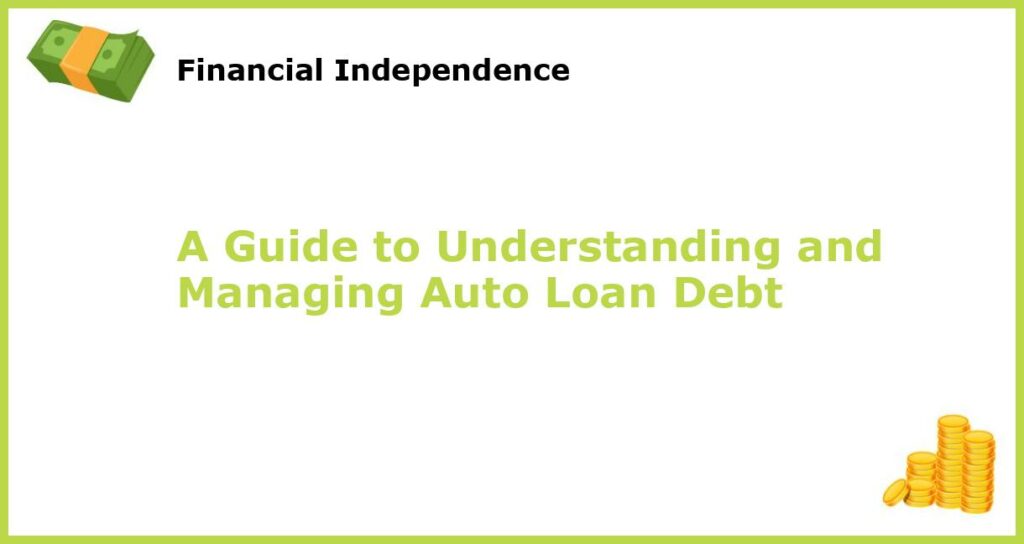Have you ever found yourself struggling to pay off your car loan? You’re not alone. Auto loan debt has become a major financial burden for many people. But fear not, with the right knowledge and strategies, you can manage your auto loan debt and improve your financial situation. In this guide, we’ll explore everything you need to know about auto loan debt and how to manage it.
What is auto loan debt?

Auto loan debt is the amount of money that you owe to finance the purchase of your vehicle. It includes the principal amount, interest, and other fees or charges associated with the loan. It’s important to note that auto loan debt is secured debt, meaning the vehicle you purchased is the collateral for the loan. This means that if you fail to make payments, your lender can repossess your vehicle to recoup their losses.
Why is it important to manage auto loan debt?

Managing your auto loan debt is essential to your overall financial health. As with any loan or form of credit, failing to manage your auto loan debt can have a significant impact on your credit score. Late payments, defaulting on your loan, and ultimately losing your vehicle can stay on your credit report for years to come. This can make it difficult to get approved for future loans, mortgages, or credit cards. It can also lead to higher interest rates, increased fees, and potential legal consequences.
How can you reduce your auto loan debt?

If you’re looking to reduce your auto loan debt, you have a few options. One of the simplest strategies is to make extra payments on your loan. This can help you pay off your loan balance faster and reduce the amount of interest you pay over time. Another option is to refinance your loan, which involves taking out a new loan with a lower interest rate to pay off your existing loan. Finally, you could sell your car and pay off the remaining loan balance, though you should be aware of any penalties or fees for early payments or loan payoffs.
What are some common mistakes people make with auto loan debt?

When it comes to managing auto loan debt, several common mistakes can be detrimental to your financial health. One of the biggest mistakes is not shopping around for the best interest rate when taking out a loan. By not taking the time to compare rates, you may end up with a higher interest rate and more debt than necessary. Other mistakes include being late on payments, rolling over a previous car loan into a new one without considering the long-term financial impact, and not understanding the terms and conditions of your loan.
How can you avoid getting into too much auto loan debt?

The best way to avoid getting into too much auto loan debt is to set a budget and stick to it. Before you start car shopping, determine what you can afford to spend each month on your car loan payments, insurance, and maintenance. Also, do your research on the make and model of the car you want to purchase. Consider a used car instead of a new one as it may be more cost-effective. Don’t forget about additional expenses such as insurance, fuel, and maintenance, which can add up over time.
What are the consequences of defaulting on an auto loan?

The consequences of defaulting on an auto loan are severe and can have long-lasting effects on your finances. The lender can repossess your vehicle, which means they can take it away from you and sell it to recoup their losses. Repossession can also damage your credit score, making it harder to get approved for future loans. In some cases, lenders may take legal action against you to collect on the money you owe them, including wage garnishment or court judgments.
What should you do if you are struggling to make your auto loan payments?

If you find yourself struggling to make your auto loan payments, it’s essential to reach out to your lender as soon as possible. They may be able to offer you a deferment or forbearance on your loan, which means temporarily delaying or reducing your payments. They might also work out a new repayment plan that fits within your budget. Whatever you do, it’s better to take action sooner rather than later to avoid the worst-case scenario of repossession.
How can you improve your chances of getting approved for an auto loan?

To improve your chances of getting approved for an auto loan, you should focus on building good credit. This means paying your bills on time, keeping your credit utilization low, and avoiding taking on too much debt. You should also aim to have a stable income and have a down payment ready to go. Finally, it’s essential to shop around and compare rates from different lenders to find the best deal.
What are some alternatives to taking out an auto loan?

If you’re looking for alternatives to taking out an auto loan, you might consider leasing a car instead. This allows you to pay for the use of the vehicle for a set period without taking on the long-term commitment of ownership. Alternatively, you could choose to buy a used car with cash, which can be a more affordable option. If you live in an area with good public transportation, you might also consider using public transit to get around.
What are some tips for managing auto loan debt?
Managing auto loan debt requires foresight and discipline. Some tips to help you manage your auto loan debt include making your payments on time every month, paying more than the minimum amount due each month to reduce your interest charges, and avoiding extended loan terms. It’s also important to keep a close eye on your credit score and review your credit report regularly to ensure there are no mistakes or fraudulent accounts.







